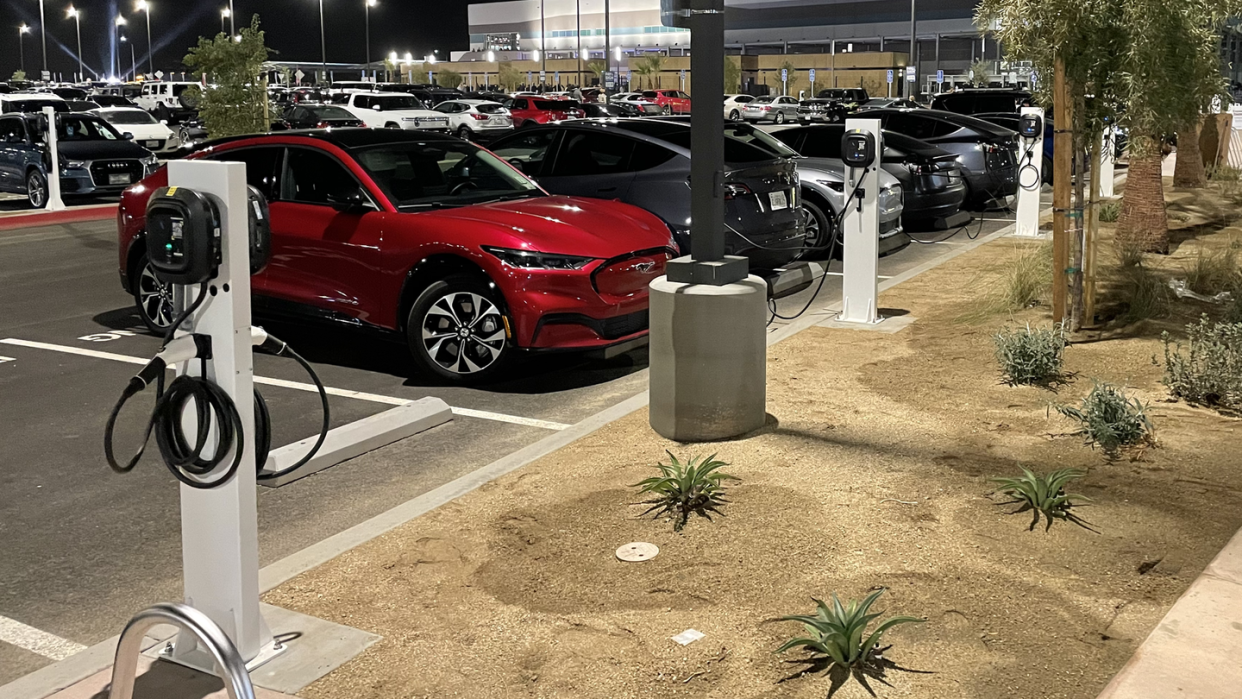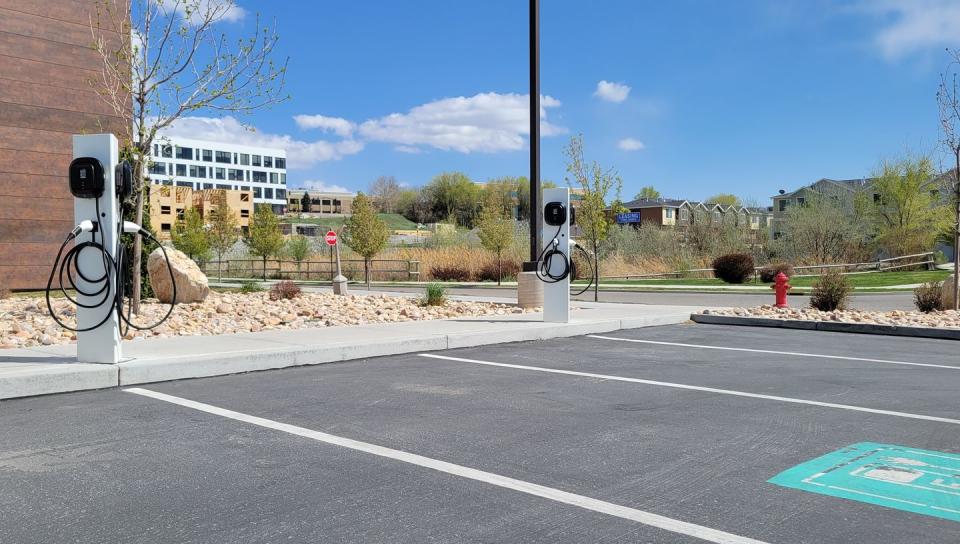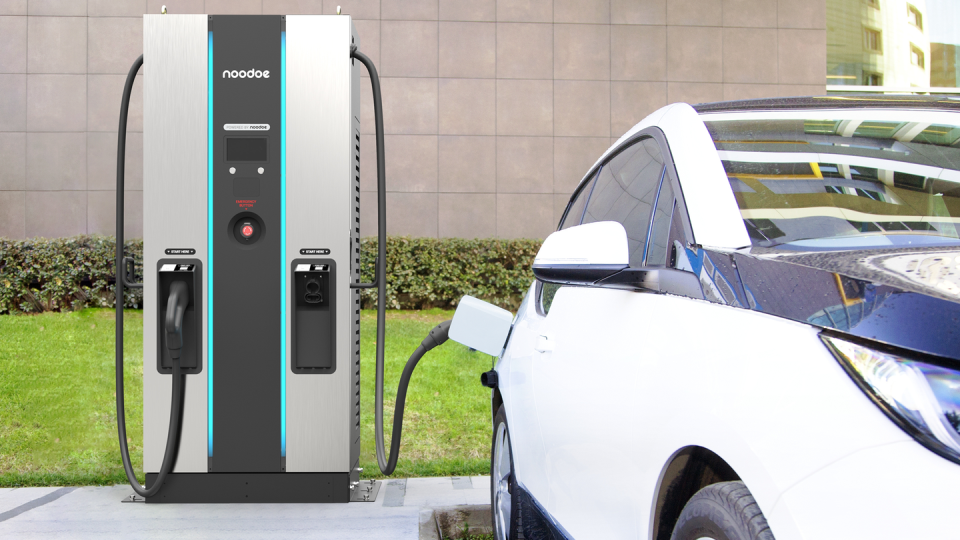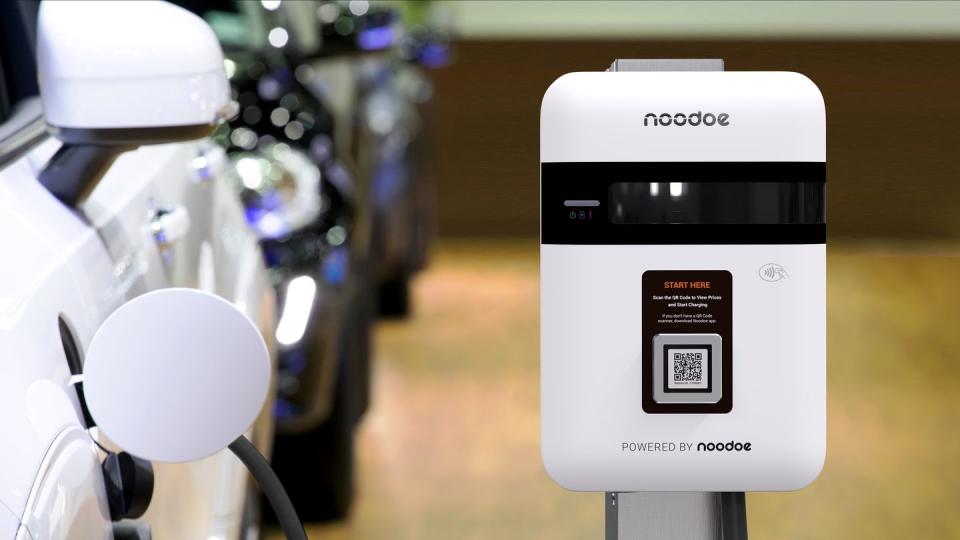It’s about Reliable EV Charging—for EVPassport and Noodoe

EVPassport claims its chargers are working 99.97% of the time. There are 5000 chargers in the network located in 35 states, Mexico, and Canada. EVPassport was an early adopter of the Tesla NACS connector.
Out-of-service chargers are a barrier to EV adoption and a constant source of frustration for owners. One academic survey of 657 fast chargers in the San Francisco Bay area found only 72.5% working.
Noodoe, another charger supplier, says it hosts more than 1000 charging sessions daily. The network has 3000 plugs internationally, and the company touts more than 99% uptime globally.
The key to getting Americans into electric cars is simplicity, says Hooman Shahidi, CEO of California-based EVPassport, which operates a charging network aimed at businesses.
“We’re on a simple mission to remove as many barriers to EV adoption as possible,” he said. “Let’s go back to basics. Right now it’s easy to find a gas station, but not a workable EV charger.”
EVPassport’s co-founder and chief technology officer, Aaron Fisher, relates a story of driving his BMW i3 from New York to Hartford, Connecticut, to dine with his 99-year-old grandmother. “Multiple layers of hardware and software failures turned this two-hour quick drive into a seven-hour journey that resulted in me missing dinner,” Fisher relates. “Needless to say, my grandmother was quite frustrated.”
Part of EVPassport’s strategy is “to make sure you don’t have to download an app, another darned app,” Shahidi told Autoweek. “We needed to get rid of that pre-requisite—so instead you just scan the QR code on the charger and it integrates with your digital wallet for payment. Two-thirds of our transactions are with Google Pay or Apple Pay.”
EVPassport makes some big claims, including that its network is “up,” as in working, 99.97% of the time. The performance is documented here. “The system phones home to Los Angeles every 60 seconds,” Shahidi said. “We wanted to focus on the platform experience, and make it sticky, as well as simple and reliable.”
Out-of-service chargers are a barrier to EV adoption and a constant source of frustration for owners. One academic survey of 657 fast chargers in the San Francisco Bay area found only 72.5% working.

The company, which has offices in Santa Monica, Brooklyn, and Barcelona, Spain, but so far is operating only in North America (with a Boston office next), is aiming at the hospitality industry and parking lots, among other potential clients.
EVPassport has signed up some hotels, including La Quinta Inns and Suites, Holiday Inn Express, and JW Marriott for a “handful” of locations; and Icon Parking, Millennium Garages, and InterPark among others.
EVPassport has signed up a ValueRock outdoor mall in Mission Viejo, California, the Houston Rockets basketball team, and hundreds of apartment complexes owned by Fairfield Residential, Shahidi said.
There are 5000 chargers in the network located in 35 states, Mexico, and Canada. EVPassport was an early adopter of the Tesla NACS connector.
The core product is a $999 payment-enabled Level 2 charger for businesses. There are various versions of the unit: Rosa (up to 11 kilowatts), Lloyd (up to 95 kilowatts), and Lily (up to 150 kilowatts), with various prices.
For $119 annually after a free year, companies get a cloud platform that handles payments, energy management, and earnings history. EVPassport handles installation and maintenance for subscribers.
The businesses pay the monthly subscription fee and get to keep 70% of the revenues generated at the chargers and, if they’re in participating states, most of the Low Carbon Fuel Standard (LCFS) credits. California businesses could especially benefit from what EVPassport offers.
The state wants to install 1.2 million Level 2 chargers by 2030, and the California Energy Commission’s “Communities in Charge” program was launched in 2023, with $30 million in available grants the first year for owners or managers of multi-family residences to offer charging.
EVPassport also says its chargers are eligible for federal National Electric Vehicle Infrastructure Program (NEVI) funding.

“A robust commercial charger would typically cost $2000 to $4000, incorporating a card reader and other amenities,” said Sam Abuelsamid, a principal research analyst for e-mobility at Guidehouse Insights. “So for site hosts, what EVPassport is offering seems like a pretty reasonable deal, assuming the company takes care of installation and maintenance.”
Last year, EVPassport hooked up with a Native American tribe, the Viejas Band of Kumeyaay, and Native American energy services provider Maada’oozh to build a charging hub along the Interstate 8 corridor at the Viejas Casino and Resort in Alpine, California, with 410 Level 2 chargers and eight dual-port fast chargers. It’s aimed at casino guests and travelers heading to and from Arizona. The hub is scheduled to open around July 4.
Another company with a similar mission to support apartment buildings and condos, hotels, auto dealerships, and fleets is Noodoe (pronounced NEW-DOUGH).
The company, which started with scooter-based battery swapping in Taiwan, is based in the US (with headquarters in Plano, Texas), and has operations in 14 other countries including Taiwan, Australia, New Zealand, and Israel, and also uses QR codes (but does also use an app).
The city of Irvine, California is a partner. The company, which says it hosts more than 1000 charging sessions daily, was launched in 2013 and entered the North American market in 2017. Hotel partners include Sheraton, Hilton, Holiday Inn, and Doubletree.

According to Jeff Rothe, vice president for sales and marketing at Noodoe, “We are an EV charging network with 3000 plugs internationally. We work with a dozen hardware manufacturers, and our customers buy the chargers and pay to install them.
“We offer five-year maintenance contracts that are around $600 for Level 2 and $15,000 to $30,000 for DC fast chargers.” Noodoe also touts more than 99% uptime globally.
In emerging markets—Myanmar is one—Noodoe “works with large organizations that want to build out their own charging networks,” Rothe said.
What type of difficulties have you encountered when trying to charge your EV? Please comment below.

